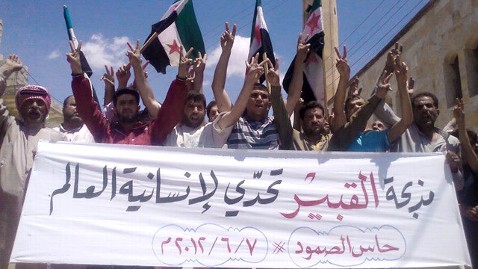'Appalling' Scene at Site of Latest Syria Massacre, Despite Lack of Bodies

Image credit: Edlib News Network ENN/AP Photo
A day after U.N. monitors were driven off by gunfire, a journalist traveling with the group today described to ABC News in chilling and graphic detail what he'd witnessed in the aftermath of Wednesday's massacre in Mazraat al-Qubair that activists said left nearly 80 dead, including women and children.
Paul Danahar, the Middle East bureau chief for the BBC, said residents in nearby villages said that a group of Alawite militia - an offshoot of Shiite Islam and some of Bashar al-Assad's supporters - attacked Mazraat al-Qubair, which is Sunni, and fatally shot and stabbed everyone and everything, including livestock.
"The scene when I arrived here was truly appalling," he said. "The stench of burnt flesh was still heavy in the air. [In one house], there were pieces of flesh and a large pool of blood in the corner. There was a tablecloth matted with blood. "
"The bodies were taken away - we were told by civilians in a pickup truck," Danahar said today. "What we did see, though, on the tarmac on the side of these houses were tracks that the U.N. said could only have been made by military vehicles."
He said the Syrian army confirmed that it was in the area, hunting down the terrorists - "that's the word they use for armed opposition groups" - who had killed those in the village.
"What's slightly confusing about the scenario is that terrorists don't normally collect the bodies of the people they've killed and take them away," Danahar said today. "Somebody's cleaned this place up to try to hide the evidence, and it's going to be very difficult to piece it together."
The Red Cross today said that 1 million to 1.5 million Syrians were in urgent need of help. Earlier today, Syrian troops continued to bomb Khaldiyeh, a rebel-held neighborhood in the city of Homs.
Danahar said the situation in the country had gone from a Syrian revolution to a Sunni revolution, particularly in rural areas such as Mazraat al-Qubair, where people are more divided.
"In the urban centers, the communities are very mixed. People don't even know what sect, what religion the people around them, their friends or their colleagues, are," he said. "In the rural areas, they are much more vulnerable to this kind of threat and intimidation."
ABC News' Alice Maggin and The Associated Press contributed to this report.